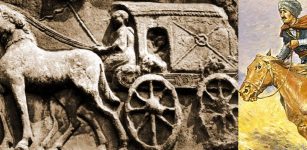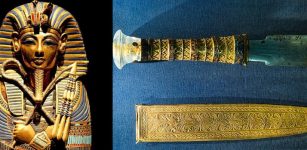Pompey The Great: One Of Roman Empire’s Most Successful Military Commanders
David Tee - AncientPages.com - Pompey was born in 106 BC, but his mother is not named in historical records. His father, Gnaeus Pompeius Strabo, is well known as a military leader who fought the Social Wars for Rome from 91 to 89 BC.
 Pompey the Great (106 BC - 48 BC), one of the prominent statesmen and generals of the late Roman Republic, who at first, was an associate and later an opponent of Julius Caesar.
Pompey the Great (106 BC - 48 BC), one of the prominent statesmen and generals of the late Roman Republic, who at first, was an associate and later an opponent of Julius Caesar.
Nothing is mentioned about Pompey's childhood years, but he did grow up to serve in his father's army. He was given a nobleman's education and was said to be fluent in Greek; he fought in the Social Wars but was not seen consistently in this military history record.
Pompey's Early Military Career
After his father's death, Pompey was part of the army of Cinna, Consul of the Roman Republic (87 BC–86 BC). According to Plutarch, Pompey visited Cinna's camp and escaped after having been accused of some wrongdoing.
The soldiers assumed that Cinna had helped Pompey escape and killed their leader for this breach of their trust. There is no record of what Pompey did during this action.
The next time he is mentioned in military records is when he brings three legions of men to join a Roman army officer and statesman, Sulla (138 BC-78 BC), and his army in their attempt to free Rome and Italy from the Marians. As a protégé of Sulla, Pompey was given the command against the fugitive Marians, who spread out to Spain, Africa, and Sicily. After marrying Sulla's daughter, Pompey was tasked with recovering both Sicily and Africa from the Marians.
He did it in 2 campaigns during the years 82 to 81. During these campaigns, Pompey got the reputation of being a ruthless leader and a butcher. But Pompey did not always make significant decisions as Sulla removed him from the former's will when in 78 BC, Pompey decided to back an enemy of his father-in-law.
Pompey And Politics
In ancient Rome, politics and the military went hand in hand. Armies led by politicians were not unknown, and Pompey was one of those politicians. Elected as consul in approx. 70 BC, Pompey was given military authority to combat the rising pirate threat that threatened the Roman corn supply.
The Triumph of Pompey. Credit: Public Domain
He dealt within the first three months of authorization, and this efficiency helped him get a Roman army placed under his command in 66 BC when Mithradates VI of Pontus threatened.
After defeating Mithridates VI of Pontus, Pompey led his army into Bithynia, Pontus, and Syria, eventually making them into Roman provinces and opening the door to the east.
Pompey's return on his birthday in 62 BC had the Romans celebrating his triumphs for two days. But the celebration was overshadowed by Pompey's political defeats. His attempts to provide land grants to his army and ratification of his eastern settlements were rejected
The First Triumvirate
The First Triumvirate was formed by Crassus, Pompey, and Caesar after Pompey suffered his first political defeats. These three men were probably Rome's most potent political and military men. It was through this union that Pompey was able to overcome those initial defeats and get land granted to his army.
It seems that Crassus was the glue of the three men. While he was alive, the three men acted together in unison and governed peacefully. Pompey even married one of Caesar's daughters, Julia, and ancient historians confirm his love for the woman.
The years 54 and 53 BC were not kind to Pompey. First, his beloved Julia died in childbirth, and then, Crassus was killed in Carrhae, Parthian Empire.
The Civil War
The tension between both Pompey and Caesar grew over the years until it became clear that one of the two had to go. Caesar came to Rome in 49 BC with an experienced army, while Pompey was left with trying to recruit one from scratch.
In 48 BC Pompey decided to meet Caesar in a pitched battle at Pharsalus in Thessaly. This was a bad decision as Caesar was too smart, his army too experienced and Pompey was not up to the match. This scenario left Pompey vulnerable and very weak.
Upon suffering enormous losses, Pompey decided to join up with Ptolemy in Egypt. Ptolemy was a former client of Pompey's; thus, the latter thought he had an ally. Unfortunately, the former had already decided to align himself with Caesar.
When Pompey arrived in Egypt, he was met by his former associate. A small boat was sent to bring him to shore. Pompey was killed before he left the boat in 48 BC.
Written by – David Tee AncientPages.com Staff Writer
Updated on August 8, 2022
Copyright © AncientPages.com All rights reserved. This material may not be published, broadcast, rewritten or redistributed in whole or part without the express written permission of AncientPages.com
Expand for referencesReferences:
Fields N. Warlords of Republican Rome
Leach J. Pompey the Great
Bloomsbury Publishing, Rome at War
More From Ancient Pages
-
 On This Day In History: Shakespeare’s King Lear Performed Before The Court Of King James I – On Dec 26, 1606
News | Dec 26, 2016
On This Day In History: Shakespeare’s King Lear Performed Before The Court Of King James I – On Dec 26, 1606
News | Dec 26, 2016 -
 Struggle To Get Mail On Time Has Lasted More Than 5,000 Years – Part 1
Featured Stories | Jul 30, 2017
Struggle To Get Mail On Time Has Lasted More Than 5,000 Years – Part 1
Featured Stories | Jul 30, 2017 -
 On This Day In History: The Only English Pope In History Of Catholic Church Elected – On Dec 4, 1154
News | Dec 4, 2016
On This Day In History: The Only English Pope In History Of Catholic Church Elected – On Dec 4, 1154
News | Dec 4, 2016 -
 Varahamihira: Indian Sage And One Of The Greatest Minds Of All Time
Featured Stories | Sep 13, 2016
Varahamihira: Indian Sage And One Of The Greatest Minds Of All Time
Featured Stories | Sep 13, 2016 -
 Mysterious Lost Civilization Of Chu And Its Powerful Kingdom
Civilizations | Nov 29, 2018
Mysterious Lost Civilization Of Chu And Its Powerful Kingdom
Civilizations | Nov 29, 2018 -
 Modern Pesticide Accelerates Corrosion Of Ancient Roman Bowl
Archaeology | Oct 6, 2022
Modern Pesticide Accelerates Corrosion Of Ancient Roman Bowl
Archaeology | Oct 6, 2022 -
 The Enigma Of The ‘Ancient Ones’, The Anasazi Cliff-Dwellers Of The Southwestern United States
Ancient Mysteries | Apr 9, 2017
The Enigma Of The ‘Ancient Ones’, The Anasazi Cliff-Dwellers Of The Southwestern United States
Ancient Mysteries | Apr 9, 2017 -
 51,000-Year-Old Bone Carving Shows Neanderthals Were Artistic Long Before Humans Arrived
Archaeology | Jul 6, 2021
51,000-Year-Old Bone Carving Shows Neanderthals Were Artistic Long Before Humans Arrived
Archaeology | Jul 6, 2021 -
 European Medieval Burial Practices Were Different Than Previously Thought
Archaeology | Sep 13, 2021
European Medieval Burial Practices Were Different Than Previously Thought
Archaeology | Sep 13, 2021 -
 Mystery Of The Brave Viking Chief Buried On The Gokstad Ship
Featured Stories | Mar 14, 2016
Mystery Of The Brave Viking Chief Buried On The Gokstad Ship
Featured Stories | Mar 14, 2016 -
 Remarkable South-Pointing Chariot – Ancient Cybernetic Machine Invented 1,700 Years Ago Is An Engineering Masterpiece
Ancient Technology | Jul 17, 2014
Remarkable South-Pointing Chariot – Ancient Cybernetic Machine Invented 1,700 Years Ago Is An Engineering Masterpiece
Ancient Technology | Jul 17, 2014 -
 Unusual Viking Women With Elongated Heads On Gotland, Sweden
Featured Stories | Mar 28, 2024
Unusual Viking Women With Elongated Heads On Gotland, Sweden
Featured Stories | Mar 28, 2024 -
 What Was Humor Like In The 13th Century?
Featured Stories | Jun 22, 2018
What Was Humor Like In The 13th Century?
Featured Stories | Jun 22, 2018 -
 Was Ancient Egyptian Science Inherited From A Lost Atlantean Civilization?
Ancient Mysteries | Sep 4, 2017
Was Ancient Egyptian Science Inherited From A Lost Atlantean Civilization?
Ancient Mysteries | Sep 4, 2017 -
 Riddle How Human’s Uniquely DNA Evolved Solved By Scientists
DNA | Jan 13, 2023
Riddle How Human’s Uniquely DNA Evolved Solved By Scientists
DNA | Jan 13, 2023 -
 Mystery Of The Lost Continent Destroyed By An Ancient Cataclysm – Mysterious Islands – Part 2
Ancient Mysteries | Aug 16, 2021
Mystery Of The Lost Continent Destroyed By An Ancient Cataclysm – Mysterious Islands – Part 2
Ancient Mysteries | Aug 16, 2021 -
 Ancient Hindu High-Tech That Contributed To Modern Science
Civilizations | Nov 11, 2014
Ancient Hindu High-Tech That Contributed To Modern Science
Civilizations | Nov 11, 2014 -
 Tutankhamun Had An Ancient Dagger From Outer Space
Archaeology | Jun 1, 2016
Tutankhamun Had An Ancient Dagger From Outer Space
Archaeology | Jun 1, 2016 -
 Controversial Statue Of Anglo-Norman Knight William Marshal In Pembroke Faces Criticism
Artifacts | May 10, 2022
Controversial Statue Of Anglo-Norman Knight William Marshal In Pembroke Faces Criticism
Artifacts | May 10, 2022 -
 What Was The Symbolism Behind Native American Feathers?
Ancient History Facts | Apr 21, 2017
What Was The Symbolism Behind Native American Feathers?
Ancient History Facts | Apr 21, 2017

